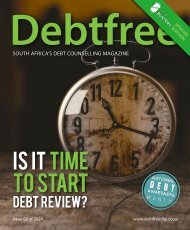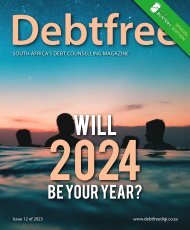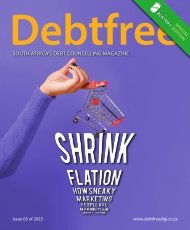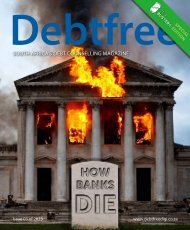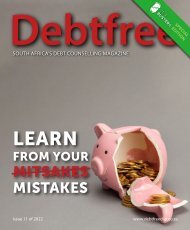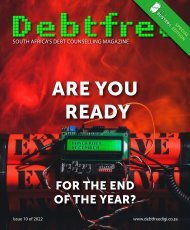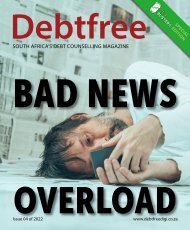July 2022 Debtfree Issue
You also want an ePaper? Increase the reach of your titles
YUMPU automatically turns print PDFs into web optimized ePapers that Google loves.
SPECIAL<br />
EDITION<br />
ARE YOU<br />
READY FOR<br />
WHEN<br />
DISASTER<br />
STRIKES?<br />
<strong>Issue</strong> 07 of <strong>2022</strong>
EXCELLENCE IS DOING<br />
ORDINARY THINGS<br />
EXTRAORDINARILY<br />
WELL<br />
– John W. Gardner
WHAT MAKES US<br />
EXCELLENT?<br />
/ Unimpaired and automated PDA systems<br />
/ Integration with top-ranked Debt Counsellor systems<br />
/ Best customer support in the country – queries are resolved within 24 hours<br />
/ Strong compliance and best-industry-practice implementation is at our centre<br />
Call Saishen Krishnan<br />
Head of Hyphen PDA | 071 884 7300<br />
Or call our friendly support centre on 011 303 0060 - Option 2<br />
or visit our website www.hyphenpda.co.za
FROM THE EDITOR<br />
I remember as a kid watching a movie about a big<br />
passenger liner ship that flips over upside down and<br />
then slowly begins sinking. Around the same time we<br />
watched a film about a massive residential building<br />
that catches fire and the people who try to escape.<br />
These were classic disaster movies.<br />
We seem drawn to disaster. It is as if we don’t want to be caught in a<br />
disaster ourselves but can’t look away when we see one.<br />
My Instagram feed loves to show me clips of people (both sober and<br />
not) falling off things or into things (however they fall, they always<br />
seem to be hurting themselves) so, it seems the algorithm knows that<br />
my fascination with disaster seems to be going strong.<br />
Sometimes, if you have a lot of debt and are struggling to make ends<br />
meet, it can feel like you are starring in a sick disaster movie of your<br />
own. One where the main character wakes up in a cold sweat at night<br />
worried about paying off their debt.<br />
If you ever feel that way well, the good news is that in this issue,<br />
we look at some steps you can take to try to future-proof your life<br />
against disasters of various kinds.
These days, many people are confronted with serious disasters that<br />
cause them immense pain and difficulty. When you are affected, it<br />
can throw your life into total chaos. So, be sure to check out how you<br />
can take steps to deal with similar challenges.<br />
We also look at what goes on each year at the annual DCASA<br />
conference and discuss the upcoming Debt Review Awards (which<br />
we are a part of). Throw in some news and tips and you have another<br />
packed issue of <strong>Debtfree</strong> Magazine.<br />
Now your bank balance may currently look like a disaster, but it<br />
does not always have to. If you keep up those monthly debt review<br />
payments and try out some of the advice in this issue, the next<br />
“movie” you star in is a fun comedy or a romantic one where you fall<br />
deeply in love with living totally debt free.
FROM THE<br />
DESK<br />
SURVEY REVEALS<br />
FINANCIAL STRESS<br />
IMPACTS ALL<br />
ASPECTS OF LIFE<br />
South Africans feel high<br />
levels of financial stress<br />
is negatively impacting<br />
their health as well as<br />
their home and work lives,<br />
but despite this most try<br />
to deal with the problem<br />
themselves rather than<br />
seek professional help.
This is according to a new “Money-stress Tracker” survey of over<br />
14,000 participants run by South Africa’s leading and largest debt<br />
counsellor. It is one of the largest surveys ever done in South Africa to<br />
determine how money-related stress impacts other aspects of life.<br />
Seventy percent of respondents said they were experiencing financial<br />
stress. Of these 94% felt this was impacting their home life and 77%<br />
their work life. Seventy six percent believed it was affecting their<br />
health.<br />
Generally, women were more stressed about their finances, home<br />
and work life and health than men. In particular, women were 30%<br />
more likely than men to be stressed about their health as a result of<br />
financial stress, and 20% more worried about paying their debt each<br />
month, compared to men.<br />
“This highlights the burden that comes with the critical role women<br />
play in South African society and is something to consider as we<br />
approach Women’s Day,” says Nosiphiwo Nxawe, manager of<br />
payments at DebtBusters.<br />
Over half of participants (52%) indicated they feel stressed or anxious<br />
about running out of money before the end of the month. Other<br />
major financial stresses were:<br />
• Struggling to pay off debt each month – 36%<br />
• Concerned about inflation – 27%<br />
• Worry about unexpected expenses – 23%<br />
• Battle to pay school fees – 15%<br />
• Worry about having enough to retire – 12%
Perhaps unsurprisingly, financial stress was most acute amongst the<br />
younger respondents and those with less income. However, 40% of<br />
all respondents were spending over half their take home pay to repay<br />
debt.<br />
“More alarmingly, 72% of all respondents<br />
need 30% or more of their take home pay to<br />
repay debt. If one considers that DebtBusters<br />
deems 30% of take-home pay to be the level<br />
at which debt repayments can be managed<br />
sustainably, one can conclude that 72% are<br />
in an unsustainable debt position.“<br />
“This is simply untenable so it’s not surprising that stress levels are so<br />
high,” says Nxawe.<br />
One in six people believed that they had less debt than their peers,<br />
while five in six believed they had the same or more debt. Under 25s<br />
generally believed that others had more debt than they did.<br />
Reactions to dealing with financial stress ranged from cutting back<br />
on monthly expenditure to selling personal items, with most people<br />
(43%) opting to tighten their belts.<br />
Twenty six percent looked to increase their income by finding a better<br />
job. Unsurprisingly younger people were more likely to seek higherpaying<br />
jobs. However, one in six (14%) said they felt stuck and didn’t<br />
know what to do.
When asked why they hadn’t acted to alleviate financial stress 39%<br />
responded they ‘felt stuck’ and 23% said they needed more time to<br />
think.<br />
Psychotherapist and Transactional Analyst, Diane Salters says people<br />
seeking debt counselling are probably going to feel shame and fear,<br />
not be thinking clearly and ready for fight, flight or freeze.<br />
“Those in freeze mode will likely feel stuck. Many responded this<br />
way in the survey. Those who are in flight mode will say they don’t<br />
need debt counselling when the overall numbers saying they are<br />
experiencing the effects of financial stress on their lives indicate they<br />
do. If they freeze, they will do nothing. Or they may be ready to flee<br />
or fight the debt collector, their partner or spouse or even their debt<br />
counsellor.”<br />
Nxawe says that comments from respondents who were currently<br />
under debt counselling reflected the informal feedback DebtBusters’<br />
receives from clients.<br />
“Once the decision is made (to proceed with debt counselling), most<br />
people feel an immense sense of relief. The fact that once in debt<br />
counselling, they aren’t constantly having to answer phone calls<br />
about outstanding payments also helps alleviate a lot of the stress.”
DEBT REVIEW<br />
LESSON #1<br />
What happens if you don’t have<br />
enough money in your account<br />
for a debit order?<br />
When a debit order fails (due to insufficient funds)<br />
banks typically charge a “penalty fee”.<br />
Fees vary but they can be a couple of hundred<br />
rand even.
CONTENTS<br />
ARE YOU READY FOR<br />
WHEN DISASTER STRIKES?<br />
NATIONAL<br />
(NOT) SAVING<br />
MONTH<br />
QUESTIONABLE<br />
COLLECTION CALLS<br />
ABOUT OLD DEBTS<br />
DISCLAIMER<br />
<strong>Debtfree</strong> Magazine considers its sources reliable and verifies as<br />
much information as possible. However, reporting inaccuracies<br />
can occur, consequently readers using this information do so<br />
at their own risk. <strong>Debtfree</strong> Magazine makes content available<br />
with the understanding that the publisher is not rendering legal<br />
services or financial advice. Although persons and companies<br />
mentioned herein are believed to be reputable, neither<br />
<strong>Debtfree</strong> Magazine nor any of its employees, sales executives<br />
or contributors accept any responsibility whatsoever for their<br />
activities. <strong>Debtfree</strong> Magazine contains material supplied to<br />
us by advertisers which does not necessarily reflect the views<br />
and opinions of the <strong>Debtfree</strong> Magazine team. No person,<br />
organization or party can copy or re-produce the content<br />
on this site and/or magazine or any part of this publication<br />
without a written consent from the editors’ panel and the<br />
author of the content, as applicable. <strong>Debtfree</strong> Magazine,<br />
authors and contributors reserve their rights with regards to<br />
copyright of their work.
ARE YOU<br />
READY FOR<br />
WHEN<br />
DISASTER<br />
STRIKES?
ARE YOU READY FOR WHEN DISASTER STRIKES<br />
IT’S A TOTAL<br />
DISASTER<br />
Disasters are becoming a part of<br />
everyday life. People around the<br />
world are facing crisis after crisis<br />
with no sign of slowing down.<br />
In some areas, natural disasters are hitting<br />
hard, over and over, while in other areas social<br />
and political upheaval has been disastrous to<br />
the economy.<br />
Faced with such an increase in disasters and<br />
all that comes with them, how can we cope?<br />
Can you prepare now, for a potential disaster?
MAP OF NATURAL DISASTERS RECORDED BY THE<br />
NATIONAL CENTERS FOR<br />
ENVIRONMENTAL INFORMATION USA
ARE YOU READY FOR WHEN DISASTER STRIKES<br />
MORE THAN<br />
EVER<br />
Studies show that it is not your<br />
imagination, there are more<br />
disasters now than when you were<br />
young. They are increasing in<br />
frequency and in how much damage<br />
they do.<br />
2020 was a good example of how things can<br />
change overnight. Your best laid plans can<br />
quickly be thrown out the window, when a<br />
pandemic or other disaster strikes.<br />
In our own lives, we can face smaller but<br />
just as devastating disasters. These sudden<br />
circumstance changes can force us into<br />
difficult situations.
ARE YOU READY FOR WHEN DISASTER STRIKES<br />
FINANCIAL<br />
DISASTERS<br />
When faced with any disaster it<br />
normally comes with a financial<br />
cost.<br />
We might be making good progress in paying<br />
off our debts and covering our monthly costs<br />
when a sudden disaster piles on these extra<br />
costs.<br />
We may need to cover a huge medical bill,<br />
funeral costs, repairs to a vehicle or appliance,<br />
or a family member suddenly loses their job.<br />
All these things are hard to manage and can<br />
leave you feeling drained and unsure about<br />
how to cope.
ARE YOU READY FOR WHEN DISASTER STRIKES<br />
EXPECT THE<br />
UNEXPECTED<br />
With disasters on the increase, we<br />
need to mentally prepare ourselves.<br />
We need to think what we would do<br />
when faced with such challenges,<br />
and have some broad ideas on how<br />
we will react.<br />
We also need to take practical physical steps<br />
to prepare.<br />
This may mean starting to save towards a<br />
rainy day, or having a practice session with<br />
the family for a natural disaster. Reviewing<br />
question like these will help you to be<br />
prepared.<br />
• Where would you go?<br />
• Who would you call?<br />
• Do the kids know where you live and<br />
where granny lives?<br />
• Do they know phone numbers off by<br />
heart etc.
ARE YOU READY FOR WHEN DISASTER STRIKES<br />
NATURAL<br />
DISASTERS<br />
It seems that we read about a<br />
different natural disaster almost<br />
every day now. If it is not a Tsunami,<br />
then a volcano, mudslide or<br />
earthquake. There have been heat<br />
waves and extreme winds and rain<br />
all over the world. South Africa has<br />
not been exempt, and those living<br />
in KZN are all too familiar with the<br />
ramifications of such a disaster.<br />
Homes and businesses were left without<br />
water, sewage connections or electricity.<br />
Property was damaged and this created extra<br />
expenses and hardship for those effected.<br />
Suddenly, many people were presented with a<br />
bunch of extra costs that they never thought<br />
they would have. This is the reality when there<br />
is a natural disaster.
Business can also be<br />
seriously affected,<br />
and it can cause<br />
warehouses and shops<br />
to close for long<br />
periods of time. People<br />
might shop less, as<br />
they use their money<br />
elsewhere to cover<br />
costs. This means that<br />
if you live in an area<br />
affected by a natural<br />
disaster, you could<br />
face these challenges<br />
of losing income or<br />
even your job.
ARE YOU READY FOR WHEN DISASTER STRIKES<br />
YOUR<br />
VEHICLE<br />
Having a vehicle is convenient, and<br />
many use their vehicle to earn a<br />
living.<br />
Still maintaining a vehicle is expensive and<br />
most people have to save a little each month<br />
towards services and maintenance. New<br />
tyres do not come cheap, even licenses are<br />
expensive.<br />
If someone rides into the back of you while<br />
you are stopped at the traffic light, or when<br />
something unexpected on the car breaks,<br />
you are suddenly faced with extra costs that<br />
can derail you budget and make it hard to<br />
cover your regular monthly costs and debt<br />
obligations.<br />
Suddenly you realise why people say a vehicle<br />
is a liability and not an asset.
FREE BOOKLET<br />
TO DOWNLOAD AND SHARE<br />
How do you leave Debt Review?<br />
How do you have the Credit Bureau remove<br />
the Debt Review listing on your credit report?<br />
Leaving Debt Review Is Not As Simple As To Simply Stop Paying.<br />
Consumers can only leave the debt review process at certain times<br />
and in certain ways.<br />
This free e book will help you navigate this process and avoid many<br />
of the common mistakes people make when wanting to leave debt<br />
review.<br />
If you are curious about how you can leave debt review properly and<br />
with no risk to your assets then be sure to download and read this<br />
free booklet<br />
DOWNLOAD AND SHARE
No more debt-stress.<br />
Let’s get it sorted.<br />
We’ll get your interest rates right down. You’ll<br />
make one consolidated payment a month. You’ll<br />
have more cash to live on. Your assets will be<br />
legally protected. Sorted.<br />
0861 365 910<br />
www.debtbusters.co.za<br />
info@debtbusters.co.za
ARE YOU READY FOR WHEN DISASTER STRIKES<br />
MEDICAL<br />
DISASTERS<br />
We all fear getting ill. None of us<br />
wants to face a prolonged or life<br />
threatening illness. We would hate<br />
for one of our loved ones to face<br />
such a situation.<br />
Besides that common fear, medical care,<br />
particularly emergency care, often comes at a<br />
high cost, doctors and dentists are not cheap.<br />
Even a small slip down some stairs can have<br />
you paying off bills at an emergency room,<br />
doctors’ bills, crutches or heading to a<br />
specialist to have an MRI to see what has been<br />
damaged.<br />
Those using public healthcare find that it<br />
may be more affordable, but it often means<br />
long hours, or even days spent sitting at the<br />
hospital or clinic, which you could be earning<br />
money.
ARE YOU READY FOR WHEN DISASTER STRIKES<br />
CLAIMING FROM<br />
INSURANCE<br />
Debt Counsellors will often encourage clients to<br />
review their insurance situation with an expert to<br />
ensure that they are covered in case of a disaster.<br />
Insurance is there to cover just such eventualities. It is prudent and<br />
having good cover is often a requirement to access credit.<br />
If you have had a vehicle accident, have to go to hospital or if your<br />
geyser blows up and floods your home, then you may well be able to<br />
claim from your insurance. This can take the sting out of the massive<br />
bills that come with such disasters.<br />
If you lose your job, then certain insurance can cover the costs of<br />
your monthly debt obligations (including debt review repayments). Be<br />
sure to ask an expert, or your debt counsellor about how that works.<br />
Still, insurance claims often mean having to pay a hefty excess first.<br />
Depending on how your insurance is set up, that can sting and where<br />
does that extra money come from?
ARE YOU READY FOR WHEN DISASTER STRIKES<br />
WHAT TO DO WHEN YOU<br />
ARE CAUGHT BY SUCH A<br />
DISASTER<br />
It can be very hard and very unfair to<br />
be hit by all the physical, emotional<br />
and financial challenges of a<br />
disaster.<br />
It is very important that if you are in debt<br />
review, and are faced with such a disaster,<br />
that you do not rush into any decisions which<br />
could derail your debt review.<br />
Take a moment. Get a realistic overview<br />
of your situation, consider the options<br />
that are before you. Perhaps write down<br />
the challenges and costs so you have the<br />
information ready to consider.<br />
Once you have an idea of the situation, be<br />
swift in reaching out to your Debt Counsellor,<br />
and ask them to discuss your options with<br />
you. They can offer valuable insights.
ARE YOU READY FOR WHEN DISASTER STRIKES<br />
A RECENT<br />
EXAMPLE<br />
As an example, consider the<br />
consumers who live in KZN and<br />
were affected by the flooding or<br />
recent riots in the area.<br />
Because they were in debt review, they were<br />
not left on their own trying to figure out<br />
what’s best. They were able to reach out to<br />
their Debt Counsellors to get advice.<br />
The Debt Counsellors then spoke to the<br />
various credit providers about the situation.<br />
Most were very sympathetic and open to<br />
making temporary changes to repayment<br />
plans. The Debt Counsellor was able to gather<br />
info from their client, do some math and work<br />
out a temporary repayment plan, and in some<br />
cases a total rework of the overall plan.<br />
Debt Counsellors were also able to remind<br />
consumers about the different types of<br />
insurance they had on their credit accounts<br />
(or specialized ones they took out when they<br />
began debt review).
This helped them to<br />
cover the cost of debt<br />
repayments for several<br />
months, while they<br />
were without income<br />
or rebuilding damaged<br />
property.<br />
By not rushing into any<br />
knee-jerk reactions<br />
to the disaster, these<br />
consumers were able<br />
to stay in the debt<br />
review process, which<br />
affects them for not<br />
only a few months but<br />
years ahead.<br />
We salute those Debt<br />
Counsellors and credit<br />
providers who went<br />
above and beyond<br />
in helping these<br />
consumers.
EMERGENCY GO BAG<br />
Important docs<br />
Food & Water<br />
Clothes & Supplies<br />
Sergei Kokota<br />
https://icon-icons.com/icon/water-apple-food-drink-fruit/53300<br />
https://icon-icons.com/icon/construction-protection-boots-shoes/65646<br />
https://icon-icons.com/icon/t-shirt-clothes-clothing/53306
DEBT REVIEW GO BAG<br />
Don’t Rush To<br />
Make Decisions<br />
Phone Your Debt Counsellor<br />
and discuss your options<br />
Save for such<br />
emergencies<br />
Choosing icons created by Becris - Flaticon - https://www.flaticon.com/free-icons/choosing
ARE YOU READY FOR WHEN DISASTER STRIKES<br />
PLAN<br />
NOW<br />
It may seem simply impossible to<br />
prepare for the unexpected. We<br />
never know exactly what type of<br />
disaster we will face. It could be<br />
any of the things we have already<br />
mentioned, or something else<br />
entirely. So, realistically how can we<br />
prepare?<br />
Since most disasters will have financial<br />
ramifications, it is wise to set aside a little<br />
money each month towards these things.<br />
Such savings must be part of your budget.<br />
• This might mean putting aside an extra<br />
R100 a month towards insurance excess.<br />
• It might mean saving another R100<br />
towards an unplanned dental, vet or<br />
medical emergency.<br />
Saving something needs to be part of<br />
your plan.
ARE YOU READY FOR WHEN DISASTER STRIKES<br />
PLAN NOW CONT’D<br />
Note: If you are using every available<br />
cent each month to pay your debts and<br />
your running costs and have no savings<br />
whatsoever, then you need to talk to your<br />
Debt Counsellor about making bigger changes<br />
to where and how you are living, shopping<br />
and earning.<br />
Since insurance may help cover many risks,<br />
it is worth talking to an expert about the best<br />
and most cost-effective products which<br />
are affordable. Many products have been<br />
specifically tailored for people in debt review.<br />
Have a go bag or supplies in your home which<br />
can help in an emergency. Primarily, this will<br />
be some long lasting food, and some water,<br />
but don’t forget to have copies of documents<br />
and helpful phone numbers too.<br />
Consider practice sessions with the kids about<br />
what to do and where to go in case of an<br />
emergency.
DEBT REVIEW<br />
LESSON #2<br />
What happens if you don’t have<br />
enough money in your account<br />
for a debit order?<br />
A missed payment on a debt (when your debit<br />
order does not go off) will negatively impact your<br />
overall credit score at the credit bureaus.<br />
Credit providers use that score to see what rate to<br />
charge you for new credit.
ARE YOU READY FOR WHEN DISASTER STRIKES<br />
IN CASE OF<br />
EMERGENCY<br />
If you face any type of disaster that<br />
affects your income and ability to<br />
make ends meet, then be sure that<br />
one of your very first calls, is to your<br />
Debt Counsellor.<br />
Even if it is a small challenge that is causing<br />
you to stress, then reach out to your Debt<br />
Counsellor sooner rather than later.<br />
If you call them, you will get advice and help<br />
that can assist you to make needed changes<br />
or arrangements to cover such costs.<br />
Remember: it is always best to speak to a<br />
qualified Debt Counsellor and not just a<br />
support staff member.<br />
With disasters becoming more and more<br />
common these days, it is likely that you will<br />
face some sort of calamity in the future. Plan<br />
ahead now so that you can successfully cope<br />
when disaster strikes.
NATIONAL<br />
(NOT)<br />
SAVING<br />
MONTH
NATIONAL (NOT) SAVING MONTH<br />
IT’S TIME TO GET<br />
YOUR<br />
SAVE ON<br />
Each year in <strong>July</strong>, consumers are<br />
encouraged to save money during<br />
National Savings month.<br />
South Africans do not have a good record of<br />
saving, and with the economy in such a state<br />
these days, it is perhaps harder to do now than<br />
ever before.
NATIONAL (NOT) SAVING MONTH<br />
RESEARCH SHOWS WHY<br />
SAVING IS<br />
SO HARD<br />
Recently, two of SA’s biggest debt<br />
counselling practices released<br />
the results of their surveys about<br />
consumers current financial<br />
situation and if they are saving, the<br />
results are a bit scary.<br />
DebtSafe spoke to 1400 people and asked<br />
them how they cope. A very scary 61% of<br />
those surveyed are actually sitting without<br />
work, and find saving impossible. Recent<br />
government stats also show that more people<br />
than ever are unemployed.<br />
Those who are employed told DebtSafe that<br />
they are really struggling to save and pay their<br />
debt obligations.<br />
Debt Counselling practice DebtBusters spoke<br />
to a whopping 14 000 consumers (specifically
those who are not in<br />
debt review) and asked<br />
them how they make<br />
ends meet.<br />
They found that 13%<br />
are using short term<br />
loans (like payday<br />
loans) to service their<br />
existing debt. 8% have<br />
resorted to selling off<br />
the things they own to<br />
cover their costs, while<br />
11% are turning to their<br />
family and friends for<br />
help to cover their<br />
costs.<br />
The traditional middle<br />
class, and people 35 –<br />
44yrs seem hardest hit<br />
with the most financial<br />
pressures, but they are<br />
not alone. Basically,<br />
everyone from all age<br />
groups and incomes<br />
are stressed about<br />
their debt situation.
NATIONAL (NOT) SAVING MONTH<br />
IT IS NOT<br />
SUSTAINABLE<br />
When DebtBusters did the math, and asked about<br />
these 14 000 consumers situation, they found that<br />
the financial situation of 60% is getting worse, and is<br />
not sustainable. They are headed for a crash and need<br />
serious help in making a sustainable plan immediately.<br />
In other recent research from DebtBusters, it revealed that inflation is<br />
growing faster than salary increases. This means that consumers are<br />
losing buying-power each year.<br />
They found that consumers lose about 5% of their buying power each<br />
year. So over the last 5 years, consumers effectively have to get by on<br />
75% of what they had back then, but with all the same obligations.<br />
This can be especially hard for those in debt review who are working<br />
according to a very tight budget and cannot use credit to plug any gaps.<br />
The research shows that employees are dissatisfied with increases<br />
and according to DebtBusters, 25% are looking for better paying jobs,<br />
and plan to leave their employer if they can find something suitable.<br />
Both practices say their research shows, that consumers are too<br />
stressed by their growing debt and the increasing cost of living to<br />
prioritise saving, most simply cannot save at all.
NATIONAL (NOT) SAVING MONTH<br />
TIME TO RELOOK<br />
AT OLD WAYS OF<br />
DOING<br />
THINGS<br />
There are many within the debt<br />
review industry that call for annual<br />
reviews of consumer’s debt<br />
repayment plans.<br />
They expect that people should have more<br />
money to repay their debt each year.<br />
These ideas were even contained in the<br />
NCR’s old 2009 task team report which is the<br />
foundation of the DCRS system, how times<br />
have changed!<br />
Research and common sense now show<br />
this is not realistic and it might be time to<br />
reconsider things entirely in line with current<br />
realities.
Perhaps debt<br />
counselling software<br />
should rather be<br />
programmed to accept<br />
further increase in<br />
repayment terms, and<br />
small reduction in<br />
repayment amounts<br />
each year, to allow<br />
consumers to cope<br />
with the realities of the<br />
ever increasing cost of<br />
living and inflation.<br />
That is one possible<br />
way to encourage<br />
those in debt review to<br />
start saving.
NATIONAL (NOT) SAVING MONTH<br />
BUDGETING & SAVING<br />
JUST NOT<br />
HAPPENING<br />
Having a monthly budget and saving<br />
funds is really important and vital to<br />
financial success.<br />
It seems simple to say, but the reality is that<br />
many consumers simply do not budget (it’s<br />
not a lot of fun to budget and can be a little<br />
scary). Interestingly, around a third of those<br />
DebtSafe spoke to, said they had no idea how<br />
to make a budget.<br />
Times are hard and it doesn’t look like things<br />
are going to get easier any time soon.<br />
With such low levels of financial education<br />
and the ever increasing cost of living and<br />
inflation outstripping people’s ability to earn a<br />
living, in the future we might realistically begin<br />
to call <strong>July</strong>: National Not Savings Month.
DEBT REVIEW<br />
LESSON #3<br />
What happens if you don’t have<br />
enough money in your account<br />
for a debit order?<br />
If you are under debt review and miss a payment<br />
(due to your debit order not going off) then<br />
your credit providers can try jump out of the<br />
arrangement and can start new legal action<br />
against you again.
STEP-BY-STEP<br />
DREX GUIDE<br />
DREX simplifies the exchange of data and makes managing the<br />
debt review process less admin intensive.<br />
The below links take you to step-by-step guides on how to use the<br />
DC Portal on DREX.<br />
How to Register on the DC Portal<br />
Introduction to the DC Portal<br />
Accessing a Consumer's Profile
QUESTIONABLE<br />
COLLECTION<br />
CALLS ABOUT<br />
OLD DEBTS
QUESTIONABLE COLLECTION CALLS ABOUT OLD DEBTS<br />
WHAT THE<br />
LAW SAYS<br />
In South Africa, like many other<br />
countries, there are laws about<br />
credit providers trying to collect<br />
many years later.<br />
The Prescription Act and refinements in<br />
understanding from court cases and other<br />
legislation stops credit providers from<br />
forgetting about a debt and then many years<br />
later coming back to demand payments.<br />
In general* if you have not been contacted by<br />
a credit provider about a debt for 3 years and<br />
have not paid money towards that debt for 3<br />
years and have not been taken to court over<br />
this older debt then the debt has prescribed<br />
(or died).<br />
It then becomes illegal for credit providers to<br />
collect such debt.<br />
*and we are being pretty general here as there are specific laws all about<br />
this sort of thing. Another good thing to know is that paying something<br />
towards a debt that has already prescribed does not mean that the debt is<br />
somehow active again and that you have to carry on paying. Once it dies,<br />
it is dead.
QUESTIONABLE COLLECTION CALLS ABOUT OLD DEBTS<br />
GIVE US<br />
OUR MONEY!<br />
But just because something is not<br />
legal does not mean that you will<br />
never get a call about such debts.<br />
Recently, the Banking Ombud released stats<br />
for 2021 and <strong>2022</strong> (so far) that showed many<br />
consumers are asking them for help about<br />
collection calls about older debt. While in<br />
many cases the credit provider or collections<br />
agents were justified in getting in touch, the<br />
Banking Ombud found that around a third<br />
of the matters that were brought to them<br />
involved a credit provider or collections<br />
company trying to collect on prescribed debt.<br />
So, if you have some older debts that you<br />
have nearly forgotten about don’t be surprised<br />
if one day someone starts calling you about<br />
them. Do, however, remember that older,<br />
unacknowledged, unpaid debt does prescribe<br />
if the credit provider has been too lazy to take<br />
the matter to court.
WWW.DEBTREVIEWAWARDS.CO.ZA<br />
The annual Debt Review Awards will<br />
be held on Friday, 30th September in<br />
Cape Town and online live streamed<br />
over Youtube for all to enjoy.
The Awards recognise the hard work and excellence<br />
of those working in the debt review field. Credit<br />
providers, PDAs, over 50 Debt Counsellors and several<br />
individuals in the industry will be recognized on the<br />
day.<br />
PEER REVIEWS<br />
At present, the final rounds of peer reviews are<br />
being done by various members of the industry. The<br />
reviews are completed by registered individuals and<br />
representatives who have many years of experience in<br />
the industry.<br />
During <strong>July</strong> and August many registrants will be asked<br />
to do some of the most detailed reviews to date thus<br />
far as we delve deep into the various criteria that is<br />
considered. This can be things like:<br />
• How does this credit provider assist you when it<br />
comes time to get a paid up letter or sort out an<br />
end balance dispute?<br />
• It might be questions about how many of a<br />
particular Debt Counsellor’s clients actually pay in<br />
line with what has been promised in the proposals<br />
and court orders.
This deep dive helps identify those within the industry<br />
that are doing well, and that others should try and<br />
emulate.<br />
If you have not yet had much of a chance to complete<br />
any reviews, you will no doubt be getting emails<br />
and links from the organisers, various PDAS and<br />
associations over the next few days.<br />
We want to thank all those who have been completing<br />
reviews this year and those still to do so.<br />
The compiled and audited results of the peer reviews<br />
will be announced live during the Awards show.<br />
For more information, you can visit<br />
www.debtreviewawards.co.za.<br />
*Please note that only those authorised within a large credit provider can sign<br />
up on behalf of the “brand” or department. This is checked by the Awards<br />
organisers and audit team to ensure no duplication in submissions.




